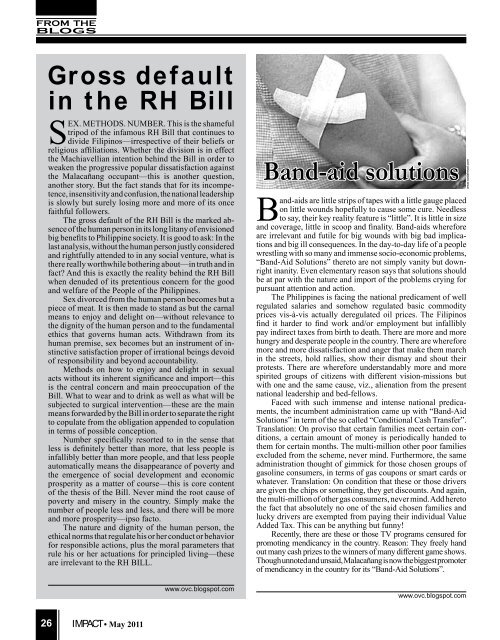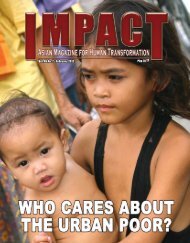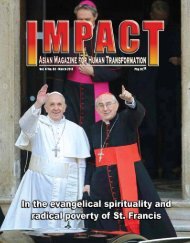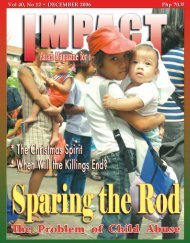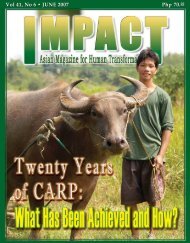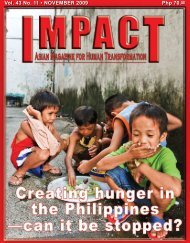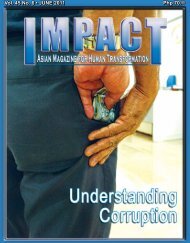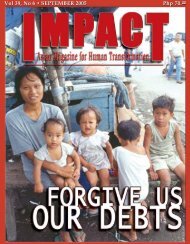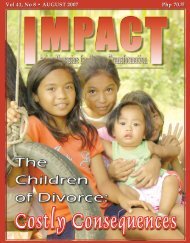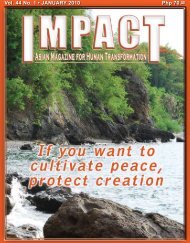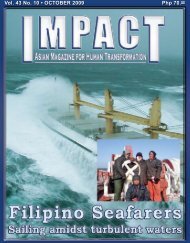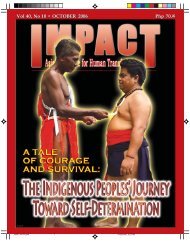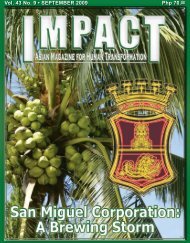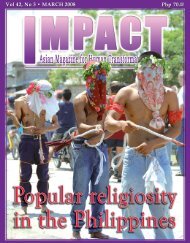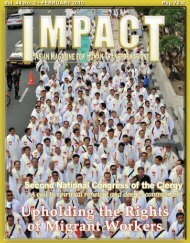Php 70.00 Vol. 45 No. 5 • MAY 2011 - IMPACT Magazine Online!
Php 70.00 Vol. 45 No. 5 • MAY 2011 - IMPACT Magazine Online!
Php 70.00 Vol. 45 No. 5 • MAY 2011 - IMPACT Magazine Online!
Create successful ePaper yourself
Turn your PDF publications into a flip-book with our unique Google optimized e-Paper software.
FROM THE<br />
BLOGS<br />
EDITORIAL<br />
Gross default<br />
in the RH Bill<br />
SEX. METHODS. NUMBER. This is the shameful<br />
tripod of the infamous RH Bill that continues to<br />
divide Filipinos—irrespective of their beliefs or<br />
religious affiliations. Whether the division is in effect<br />
the Machiavellian intention behind the Bill in order to<br />
weaken the progressive popular dissatisfaction against<br />
the Malacañang occupant—this is another question,<br />
another story. But the fact stands that for its incompetence,<br />
insensitivity and confusion, the national leadership<br />
is slowly but surely losing more and more of its once<br />
faithful followers.<br />
The gross default of the RH Bill is the marked absence<br />
of the human person in its long litany of envisioned<br />
big benefits to Philippine society. It is good to ask: In the<br />
last analysis, without the human person justly considered<br />
and rightfully attended to in any social venture, what is<br />
there really worthwhile bothering about—in truth and in<br />
fact? And this is exactly the reality behind the RH Bill<br />
when denuded of its pretentious concern for the good<br />
and welfare of the People of the Philippines.<br />
Sex divorced from the human person becomes but a<br />
piece of meat. It is then made to stand as but the carnal<br />
means to enjoy and delight on—without relevance to<br />
the dignity of the human person and to the fundamental<br />
ethics that governs human acts. Withdrawn from its<br />
human premise, sex becomes but an instrument of instinctive<br />
satisfaction proper of irrational beings devoid<br />
of responsibility and beyond accountability.<br />
Methods on how to enjoy and delight in sexual<br />
acts without its inherent significance and import—this<br />
is the central concern and main preoccupation of the<br />
Bill. What to wear and to drink as well as what will be<br />
subjected to surgical intervention—these are the main<br />
means forwarded by the Bill in order to separate the right<br />
to copulate from the obligation appended to copulation<br />
in terms of possible conception.<br />
Number specifically resorted to in the sense that<br />
less is definitely better than more, that less people is<br />
infallibly better than more people, and that less people<br />
automatically means the disappearance of poverty and<br />
the emergence of social development and economic<br />
prosperity as a matter of course—this is core content<br />
of the thesis of the Bill. Never mind the root cause of<br />
poverty and misery in the country. Simply make the<br />
number of people less and less, and there will be more<br />
and more prosperity—ipso facto.<br />
The nature and dignity of the human person, the<br />
ethical norms that regulate his or her conduct or behavior<br />
for responsible actions, plus the moral parameters that<br />
rule his or her actuations for principled living—these<br />
are irrelevant to the RH BILL.<br />
www.ovc.blogspot.com<br />
Band-aid solutions<br />
Band-aids are little strips of tapes with a little gauge placed<br />
on little wounds hopefully to cause some cure. Needless<br />
to say, their key reality feature is “little”. It is little in size<br />
and coverage, little in scoop and finality. Band-aids wherefore<br />
are irrelevant and futile for big wounds with big bad implications<br />
and big ill consequences. In the day-to-day life of a people<br />
wrestling with so many and immense socio-economic problems,<br />
“Band-Aid Solutions” thereto are not simply vanity but downright<br />
inanity. Even elementary reason says that solutions should<br />
be at par with the nature and import of the problems crying for<br />
pursuant attention and action.<br />
The Philippines is facing the national predicament of well<br />
regulated salaries and somehow regulated basic commodity<br />
prices vis-à-vis actually deregulated oil prices. The Filipinos<br />
find it harder to find work and/or employment but infallibly<br />
pay indirect taxes from birth to death. There are more and more<br />
hungry and desperate people in the country. There are wherefore<br />
more and more dissatisfaction and anger that make them march<br />
in the streets, hold rallies, show their dismay and shout their<br />
protests. There are wherefore understandably more and more<br />
spirited groups of citizens with different vision-missions but<br />
with one and the same cause, viz., alienation from the present<br />
national leadership and bed-fellows.<br />
Faced with such immense and intense national predicaments,<br />
the incumbent administration came up with “Band-Aid<br />
Solutions” in term of the so called “Conditional Cash Transfer”.<br />
Translation: On proviso that certain families meet certain conditions,<br />
a certain amount of money is periodically handed to<br />
them for certain months. The multi-million other poor families<br />
excluded from the scheme, never mind. Furthermore, the same<br />
administration thought of gimmick for those chosen groups of<br />
gasoline consumers, in terms of gas coupons or smart cards or<br />
whatever. Translation: On condition that these or those drivers<br />
are given the chips or something, they get discounts. And again,<br />
the multi-million of other gas consumers, never mind. Add hereto<br />
the fact that absolutely no one of the said chosen families and<br />
lucky drivers are exempted from paying their individual Value<br />
Added Tax. This can be anything but funny!<br />
Recently, there are these or those TV programs censured for<br />
promoting mendicancy in the country. Reason: They freely hand<br />
out many cash prizes to the winners of many different game shows.<br />
Though unnoted and unsaid, Malacañang is now the biggest promoter<br />
of mendicancy in the country for its “Band-Aid Solutions”.<br />
www.ovc.blogspot.com<br />
www.sodahead.com<br />
Aristocracy and democracy<br />
This is simply meant to reflect on the incongruous<br />
pairing of aristocracy and democracy—without<br />
necessarily thinking of some families vis-à-vis<br />
people in general, without automatically making reference<br />
to certain highly favored and distinct individuals<br />
holding high and sensitive offices in government in<br />
relation to the populace in general.<br />
This is intended to point out that there is definitely<br />
something queer, strange and/or suspicious when aristocrats<br />
assume governance over commoners, i.e., when<br />
wealthy and influential dynasties rule over the poor<br />
and miserable. And the reservation with the pairing<br />
rests on the empirical fact that aristocracy does not or<br />
cannot understand—much less realistically accept—the<br />
fundamental equality of human persons which is the<br />
anchorage of real and living democracy.<br />
This country is proud to claim that it has a democratic<br />
form of government long since. And in essence,<br />
democracy is government from the people, by the<br />
people and for the people. Where then is aristocracy<br />
in democracy?<br />
The Philippines proudly proclaims that its people<br />
as a whole is sovereign in their decision making and<br />
the pursuant enactment of laws for their own common<br />
good and public welfare. Where then is aristocracy in<br />
democracy?<br />
The democratic people of the Philippines are already<br />
poor and hungry, and are in fact becoming even poorer<br />
and hungrier. There is now a seeping spirit of mendicancy<br />
among them. Where then is aristocracy in democracy?<br />
Saying it more clearly, the multi-million common<br />
Filipino people have been long since big losers in their<br />
governance by aristocrats, i.e., very rich and powerful<br />
families, distinctly educated and favored dynasties,<br />
individuals with their feet above ground reality, with<br />
their heads in Cloud 9. These are aristocratic clan<br />
members who are basically insensitive to the plight of<br />
the hungry, the lot of the homeless, the misfortune of<br />
the weak and ignorant.<br />
And stating it more bluntly, Filipinos in general<br />
better stay quiet and stay still when they continue to<br />
“elect” aristocrats in their supposedly democratic<br />
country—when they allow themselves to be mesmerized<br />
by aristocratic figures during “election”. The two key<br />
words are deliberately quoted when the Filipino electorate<br />
allow themselves to be duped by candidates from<br />
the aristocracy making popular campaign declamations,<br />
shouting populist electoral platforms. They are fun to<br />
hear, pleasant to behold. But sorry! They do not know<br />
what they are saying. Please think deep and well—and<br />
conclude for yourselves what the truth is about the so<br />
called “Philippine Democracy”.<br />
Illustration by Bladimer Usi<br />
26 <strong>IMPACT</strong> <strong>•</strong> May <strong>2011</strong><br />
<strong>Vol</strong>ume <strong>45</strong> <strong>•</strong> Number 5 27


